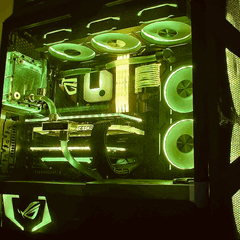ARM desktop cpus when?
On 5/31/2021 at 1:20 PM, Kaustubh Tandon said:I have few questions about arm desktop cpu
1. I want to ask when can we expect arm desktop CPU?
2. What will the advantages and disadvantages of arm CPUs?
3. Is arm better than x86 and is there any possibility that intel and amd produce arm cpus?
Thank-you
Its going to be a while before we see something. I mean technically there is a Surface Tablet that runs on a Snapdraggon CPU. The issue is, Qualcomm is no Apple. Their CPU's are not really built for desktop use like the M1. And seeing how Apple is unlikely going to share its silicone with anyone we have to wait for a company to recreate what Apple did for the PC's. I personally dont think Qualcomm cares enough to really want to be competitive in the desktop market. I mean many phones and tablets already use their silicone and they really have no reason to care about the desktop market, when they pretty much own a good chunk of the mobile market. Now keep in mind that Nvidia has their Tegra ARM CPU which is used in the Nintendo Switch. And I guess AMD is developing its own ARM CPU, AMD does have CPU design under their belt, so maybe in a generation or two they might have a good contender.
The other side of the coin is Windows and Windows software was developed for X86. No one is going to go back and rewrite a lot of this old software. The fact is the market share Microsoft does have is really only due to the legacy support that Windows has. While a lot of stuff has moved to the cloud, there are still companies out their using old outdated software because why fix what's not broke. Some of that said software was developed in house and they dont want to pay to update it. While there is emulation you can do to run x86 on ARM, Microsofts implementation is not that great, as in no where close to Apple's Rossetta 2. Even then emulation has its limits.
For Microsoft to move to ARM it would have to give up on legacy support. While they could do short term legacy support like Apple is doing with Rossetta 2, they would be stuck if they did it long term. I would say a good portion of their customers are their customers due to legacy support. So while Microsoft wants to have ARM computers, they have to treat them like a secondary project because their customers dont want change.
Keep in mind the backlash they got when Windows XP got cut. Because a lot of especially old people where like "You will have to drag my Windows XP out of my cold dead hands".




















Create an account or sign in to comment
You need to be a member in order to leave a comment
Create an account
Sign up for a new account in our community. It's easy!
Register a new accountSign in
Already have an account? Sign in here.
Sign In Now